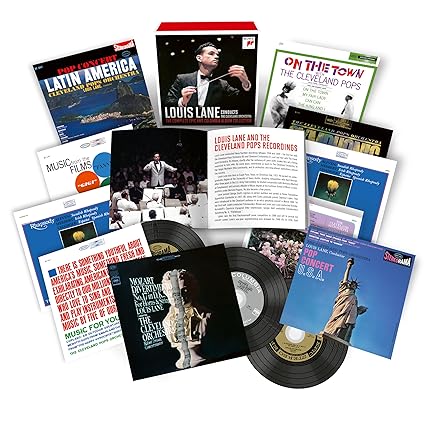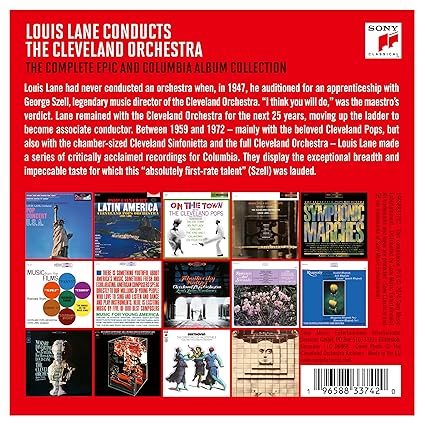I have to say how much I admire and respect SONY for always giving credit where credit is due, clearly identifying the original record labels on their reissued material – from RCA to CBS, or specifically on this box, Epic and Columbia – right on the front and back covers, in all capital letters. As opposed to Warner, which claims everything as their own – never acknowledging (or even mentioning anywhere in the documentation) the record labels which made and produced the recordings they endlessly reissue under their own logo (EMI, Virgin, etc.).
I had only been vaguely familiar with Louis Lane before acquiring this box set. I have seen his name pop up occasionally on filler material for various SONY Essential Classics CDs of (primarily) Ormandy, Szell and Bernstein collections. I also remember a couple much later Telarc recordings he made with the Atlanta Symphony (Respighi and Copland). In my mind, I always thought of Lane as a somewhat uninteresting conductor – in a category along with others similarly regarded, such as Yoel Levi for example. They just never excited me. But after listening to this marvelous box set of his early CBS (et al) recordings, I’m beginning to change my view of him – for these are quite good.
There are 14 CDs here – most of which are, as usual these days, presented as the original LPs were, thus with very short playing times – most under 40 minutes. (There are just three exceptions of CDs filled to over 60 minutes.)
I was expecting to be underwhelmed listening to this set, but that rarely was the case. I found the vast majority of these recordings musical, engaging and thoroughly enjoyable. Disc after disc we hear consistently involving, committed readings – extremely well played with precision and an adherence to the letter and spirit of the scores a priority – which one would expect from Szell’s orchestra. But there is a surprising amount of warmth and expressiveness not always heard from Szell. Tempos are generally well-chosen throughout – sensible rather than exhilarating, but musically just right. Best of all, the repertoire is interesting, varied and enterprising. A couple even offer some real rarities that I hadn’t encountered before. And the recorded sound, which has been expertly remastered for this set, is remarkably good (with one notable exception, which I will get to.)
I’ll not go into great detail, as there is a lot of material here. But it’s important to note that Lane conducts three orchestras (sort of) in this collection: The Cleveland Pops Orchestra – which is the Cleveland Orchestra with the “pops” nomenclature added for contractual purposes (not unlike the Boston Pops vs Boston Symphony); a smaller ensemble, The Cleveland Sinfonietta – consisting of 20 first-chair and supporting players from the ranks of the Cleveland Orchestra; and finally, The Cleveland Orchestra itself.
CDs 1, 2 and 3 provide top quality “light classics” without veering into Arthur Fiedler territory. Lane wisely avoids the typical pops fare done with such flair by the Boston Pops. The Clevelanders are perhaps rather too sophisticated for that, but what they do play is lively, enthusiastic and enjoyable. On Disc 1, Copland’s Rodeo excerpts (only 3, despite the title “4 Dance Episodes”) and Bernstein’s Candide Overture have appeared before on Essential Classics collections (as noted above). What’s especially nice here is having Morton Gould’s American Suite and Piston’s The Incredible Flutist as well.
There is an innovative collection of fairly uncommon Latin selections on Disc 2 (after a Gershwin overture), which turned out to be one of the most enjoyable discs of the set. Delightful and thoroughly idiomatic, Lane is in his element in this music. Especially welcome are Gould’s Guaracha and Lecuona’s Andalucia suite, where in the first of two sections, the glorious texture and air around the Cleveland strings en masse is simply amazing – particularly for a 1959 vintage recording. And notable on Disc 3 are three rousing excerpts from Bernstein’s On The Town on a terribly short program (even for a 1960 LP), which plays for just 34 minutes.
Disc 4 is the odd man out – musically and sonically. A collection of pieces featuring the flute, indifferently played here by principal flutist Maurice Sharp. He has a cool, thin tone, with little expressiveness and an extremely fast, narrow vibrato (if any; often none at all), which doesn’t really suit this richly Romantic music. Why he – of all the principal players in this magnificent orchestra – is featured on an entire album is beyond comprehension. There is some lovely music here, spoiled not only by the lack of warmth in the flute playing, but by unnecessary spotlighting from the engineer. This is so conspicuous because the sound everywhere else is realistically balanced and remarkably natural. Even in Honegger’s Concerto da Camera, which features a solo English Horn and flute, both soloists are ridiculously spotlit, seemingly in an entirely different acoustic from the orchestra. Worse, the close-up scrutiny of this English horn renders it sounding rather like a saxophone. This CD is the rotten apple of the bunch.
Tempos certainly pick up in a program of symphonic marches on Disc 5 – including a stirring Rakoczy March (Berlioz) played at quite a clip, and an absurdly fast March from Symphonic Metamorphosis (Hindemith), where the strings are all but buried in the mix in all their busywork which can’t possibly be played with any kind of clarity at this speed. (This was a real surprise coming from the normally very sensible Lane.) The highlight of this program is most certainly the short excerpt from Rimsky-Korsakov’s Le Coq d’or, which is so wonderfully done, one laments he didn’t record the entire suite – especially with such atmospheric recording (amazing for 1960).
Another standout is Disc 6, which presents some rarely heard arrangements of movie music by the fabulous Robert Russell Bennett – including wonderful suites from Gigi and Exodus – and the charming Acadian Songs and Dances from Virgil Thomson’s Louisiana Story.
A splendid Outdoor Overture (Copland) on Disc 7 starts off the real pick of the bunch – “Music for Young America“. The program also includes 3 selections from Menotti’s Amahl and the Night Visitors, Wallingford Riegger’s Dance Rhythms and Arthur Shepherd’s wonderful The Old Chisholm Trail. There’s also a fantastic ballet suite from The Happy Hypocrite by Herbert Elwell. I was not familiar with most of this music and found it rewarding and gratifying. It is cause for celebration to have it on CD at last. What a wonderful album this is – superbly recorded and still sounding terrific today.
Disc 8 combines 2 disparate albums, separated by 8 years (1961/1969). I wasn’t really in the mood for bleeding chunks of Tchaikovsky waltzes, but Lane has such a natural flair for the waltz, they are not only enjoyable, but positively infectious! Not at all bombastic (which is too often the case in Tchaikovsky), they are infused with charm and finesse, lilting so delightfully it’s nearly impossible to sit still while they play.
The mood abruptly changes for the second half with some relaxing Debussy and Satie, plus Ravel’s Introduction and Allegro in a version for string orchestra. I prefer this piece in its original scoring for string quartet, flute, clarinet and harp, but it’s so delicately and tastefully played here in Lane’s hands, it is positively lovely – aided by exceptionally sumptuous and atmospheric sound. Why these were placed here after the boisterous Tchaikovsky waltzes, rather than on the next disc, is baffling. But I can’t complain.
Loveliness (and sumptuous recorded sound) pervades Disc 9, with VW, Delius and Warlock – interrupted by Francaix’s irrepressible Serenade. Surely the Debussy, Ravel and Satie from the previous disc would have been perfect partners here.
Meanwhile, the Rhapsodies on Disc 10 are civilized rather than rousing in their buttoned-down refinement. This is the one program in which I wished for more verve from this conductor, who exhibits the mild-mannered temperament I was actually expecting to encounter more often in the set. This disc is somewhat of a disappointment compared to the excellence of everything around it, where Lane is usually very impressive. But on this day, he sounds rather halfhearted and uninspired.
After this, I wasn’t in the mood for a Mozart Divertimento (#17 in D major) on the next disc – especially played by the full Cleveland string section rather than the original chamber version for 6 players. One wonders why this was chosen for a recording session – and not with the Sinfonietta, but the full Cleveland Orchestra! But just as in the waltzes earlier, I was pleasantly surprised at how absolutely delightful it is. Lane is masterful in keeping this music light, joyful, lilting, and above all, graceful. This is 43 minutes of sheer bliss. And concertmaster Rafael Druian is ever stylish and musical in his many soloistic passages.
Lane brings a vivacious spirit to the 1st symphonies of Mendelssohn and Schubert On Disc 12. The Mendelssohn has always been one of my favorites and Lane does it as well as anyone. The crisp articulation in the strings, the expressive singing lines in the winds, and the airy, silky recorded sound all combine for a winning performance. The appealing sweetness and alluring sheen to the strings are simply glorious.
Interestingly, this album includes an alternate Scherzo which Mendelssohn himself apparently substituted for the original Menuetto when he first conducted this symphony. It’s a repurposed version of the scherzo from his Octet, shortened to just over 3 minutes and recomposed in many places. Lane was the first to record this version in 1966 and it is supplemented at the end of the symphony (which includes the original 3rd movement as well). Fascinating. (Incidentally, this has appeared on CD before – on a 1997 Essential Classics “Take Two” release along with Ormandy’s Italian Symphony.)
I’ve never loved Schubert’s 1st as much as his others, but Lane almost makes me think otherwise. His lightness of touch, crisply articulated strings and joyous exuberance are most convincing.
Beethoven’s Creatures of Prometheus is certainly welcome, filling Disc 13 with nearly 63 minutes of this neglected score. It is characterful and stylish in Lane’s hands, revealing so much wonderful music which has perhaps been underestimated over time. The only caveat I’d mention is the hall acoustic here is a bit more reverberant than noted elsewhere in this collection – which doesn’t exactly benefit Beethoven. But it’s not serious, and the music-making is so engaging, one quickly forgets the acoustic.
And at last we come to the final disc, which is yet another one I wasn’t real interested in hearing. And this time, Lane doesn’t successfully change my mind – at least not in the ballet suite, The Wise Virgins. I’ve always thought Walton’s orchestrations of Bach chorales rather pointless; and I still do. I suppose they are appropriate in conjunction with an actual ballet performance, but as purely orchestral music – not so much. Oh how I wish Lane had recorded some real Walton! The coupling, Tommasini’s ballet The Good Humored Ladies, is much better – thanks to the source material (Scarlatti harpsichord sonatas) and the delightful freshness Lane infuses into the score. Expert playing and sound bring the music vividly to life.
I was pleasantly surprised at how rewarding this set is. I’ve gained many hours of enjoyment listening to it. I was inspired by the musicianship of Louis Lane, and definitely impressed with the superb playing of The Cleveland Orchestra. But even more, I was amazed at the warm, alluring recorded sound, which is quite remarkable for the period. During a time when RCA was at the cutting edge of using minimal microphones to create a more natural-sounding orchestra for their Living Stereo recordings (as was Mercury with their Living Presence series), CBS/Columbia was not far behind. And today, SONY has certainly perfected the art of remastering classic recordings. With the exception of Disc 4, these are quite simply glorious.











